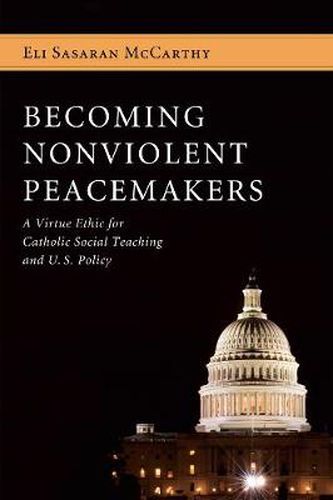Readings Newsletter
Become a Readings Member to make your shopping experience even easier.
Sign in or sign up for free!
You’re not far away from qualifying for FREE standard shipping within Australia
You’ve qualified for FREE standard shipping within Australia
The cart is loading…






This title is printed to order. This book may have been self-published. If so, we cannot guarantee the quality of the content. In the main most books will have gone through the editing process however some may not. We therefore suggest that you be aware of this before ordering this book. If in doubt check either the author or publisher’s details as we are unable to accept any returns unless they are faulty. Please contact us if you have any questions.
Why do many U.S. residents, Catholics and Catholic leaders among them, too often fall short of adequately challenging the use of violence in U.S. policy? The opportunities and developments in approaches to peacemaking have been growing at a significant rate. However, violent methods continue to hold significant sway in U.S. policy and society as the commonly assumed way to peace. Even when community organizers, policymakers, members of Catholic leadership, and academics sincerely search for alternatives to violence, they too often think about nonviolence as primarily a rule or a strategy. Catholic Social Teaching has been moving toward transcending the limits of these approaches, but it still has significant room for growth. In order to contribute to this growth and to impact U.S. policy, McCarthy draws on Jesus, Gandhi, Ghaffar Khan, and King to offer a virtue-based approach to nonviolent peacemaking with a corresponding set of core practices. This approach is also set in conversation with aspects of human rights discourse to increase its possible impact on U.S. policy. As a whole, Becoming Nonviolent Peacemakers offers an important challenge to contemporary accounts of peacemaking in the U.S.
$9.00 standard shipping within Australia
FREE standard shipping within Australia for orders over $100.00
Express & International shipping calculated at checkout
This title is printed to order. This book may have been self-published. If so, we cannot guarantee the quality of the content. In the main most books will have gone through the editing process however some may not. We therefore suggest that you be aware of this before ordering this book. If in doubt check either the author or publisher’s details as we are unable to accept any returns unless they are faulty. Please contact us if you have any questions.
Why do many U.S. residents, Catholics and Catholic leaders among them, too often fall short of adequately challenging the use of violence in U.S. policy? The opportunities and developments in approaches to peacemaking have been growing at a significant rate. However, violent methods continue to hold significant sway in U.S. policy and society as the commonly assumed way to peace. Even when community organizers, policymakers, members of Catholic leadership, and academics sincerely search for alternatives to violence, they too often think about nonviolence as primarily a rule or a strategy. Catholic Social Teaching has been moving toward transcending the limits of these approaches, but it still has significant room for growth. In order to contribute to this growth and to impact U.S. policy, McCarthy draws on Jesus, Gandhi, Ghaffar Khan, and King to offer a virtue-based approach to nonviolent peacemaking with a corresponding set of core practices. This approach is also set in conversation with aspects of human rights discourse to increase its possible impact on U.S. policy. As a whole, Becoming Nonviolent Peacemakers offers an important challenge to contemporary accounts of peacemaking in the U.S.